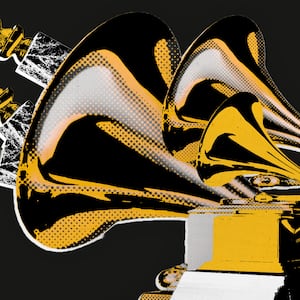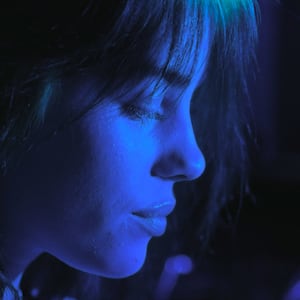At the start of Sunday night’s Grammy Awards, host Trevor Noah joked that this year’s show would be “the biggest outdoor event this year besides the storming of the Capitol.”
But the best thing about the telecast was that it never seemed bogged down by the Big Event burden that has rendered so many other pandemic-era award shows almost unwatchable. Coming a week after last week’s disastrous Zoom Golden Globes, which seemed hell-bent on recreating the ceremony’s eye-rolling forced fun in spite of extreme circumstances and in the face of the organization’s scandal, the Grammys were refreshingly… chill.
Well, as chill as an award show that featured the live TV debut of Megan Thee Stallion and Cardi B performing “WAP” could be. (That show-stopper, which had audiences at home slack-jawed and blushing in equal measure, may rank among the best Grammy performances in recent history.)
The show aired amidst the Recording Academy’s own scandals (that mirrored the Golden Globes drama in many ways), including accusations of racism and opaque, mysterious nomination practices that led The Weeknd to publicly excoriate the organization and vow never to submit his music again. Meanwhile, pandemic protocols meant that the show would resemble nothing like the scale and bombast of recent years.
Rather than wallpaper over the difficulties with some manic Amy Poehler and Tina Fey jokes, or stage infuriating mini-concerts with audiences that aren’t properly socially distanced, the show leaned into the chaos of the times, in turn producing an uncharacteristically focused telecast.
People at home have really missed live music. Noah said more earnestly in his opening monologue that he hoped the night would “celebrate the music that touched our lives and saved our souls.” It’s a semi-pretentious compliment the Grammys like to give themselves every year, but for once it was actually earned.
That’s not to say that the show escaped the shadow of its diversity scandal. There is a certain irony in the most agreeable and, at least based on my social media perusing, genuinely liked Grammys in years happening as people debate over whether the awards should matter at all. To wit, a head-scratching Record of the Year win for Billie Eilish over Megan Thee Stallion had Eilish herself apologizing from the stage at the end of the night.
That’s a shame because the show was, in large part, a showcase for the talent of Black performers, specifically Black women in the R&B and hip-hop categories that are so often marginalized by the Academy, and the messages they use their platforms to deliver.
Megan Thee Stallion had one of those star-making nights that solidifies an entertainer’s place in the top tier of talent, complete with her toast from Eilish. She took home Best New Artist—the first female rapper since Lauryn Hill won 22 years ago—and Best Rap Song. Beyoncé was alongside her for that award, as if the Queen was performing the coronation. Then there was the medley she performed alongside Cardi B, a sweat-inducing, sexy, sex-positive, athletic, and, to use her own word, savage celebration of their magnetism as performers.
There were stunning performances from Brittany Howard and Mickey Guyton, the first Black woman to be nominated for a country music award as a solo performer, who may have had the biggest crossover night of her life based on the amount of praise that poured in for her on social media.
H.E.R. won Song of the Year for “I Can’t Breathe,” a protest anthem she wrote in response to the spate of police shootings of Black men and women. Beyoncé broke the record for most Grammy wins by a female artist when she won Best R&B Performance for “Black Parade,” saying in her speech, “As an artist I believe it is my job, our job, to reflect the times. We are in such a difficult situation… I want to uplift, encourage and celebrate all the Black kings and queens that inspire me.”
The most overtly political the show became was when rapper Lil Baby staged a police shooting during his performance of “The Bigger Picture,” which seemed to have split social media reactions: “Lil Baby might have just given one of the most powerful Grammy performances ever,” on one hand and, “Someone tell me what white man is Lil Baby’s creative director?” on the other.
The night’s stagings seemed to get more complicated as the telecast went on, culminating with BTS recreating the Los Angeles Grammys set on the other side of the world so that it looked like they were performing live alongside everyone else.
Dua Lipa threw the disco dance party we’ve been craving ever since she released Future Nostalgia last spring, a triumph of apathetic fabulousness that served the exact level of energy I am willing to muster after the pandemic. Bruno Mars and Anderson .Paak crooned vocals like they were blockbuster special effects. Taylor Swift performed a Folklore medley from the set of The Hobbit. Doja Cat did something I’m too old to possibly understand.
But the refreshing thing about the show was that it otherwise seemed so stripped down, making us as viewers feel like we were all crashing a star-studded jam session. Several blocks had different artists performing in the round one after another, so you’d see Harry Styles (looking sexy as hell) bopping along to Haim, or Bad Bunny (looking sexy as hell) grooving to Dua Lipa. A country music medley featuring Mickey Guyton, Miranda Lambert, and Maren Morris was so elegant and simply executed you could practically see country-music skeptics being converted in real time.
There were creative decisions made in response to pandemic production limitations that were just plain classy, including spotlights on indie music venues and the people who work them. The show’s In Memoriam segment was gorgeously produced, replete with tributes to Little Richard, Kenny Rogers, and John Prine performed by Bruno Mars, Lionel Richie, and Brandi Carlile, respectively, that made the section one of the night’s highlights.
There’s no denying that all of it was certainly weird. Especially at the beginning, the whole thing was jarring and even a little cringe-inducing, as Noah toured the socially distanced setup, revealing what resembled a wedding tent with tiny cocktail tables that the artists would rotate between when their categories were being announced.
But it soon became clear, as the show alternated between those medleys and the surreal brunch tent where artists waited in masks to find out if they won, that this show was incredibly organized. Unlike the unnerving chaos of so many other recent award telecasts, you felt in good hands while watching, which made it easier to enjoy earnestly.
Just when you thought things were, all things considered, going pretty great, the Grammys were up to the same old shit again.
A major sticking point of the diversity controversy is how often deserving Black performers are overlooked in the major categories. Sunday, Taylor Swift won Album of the Year for Folklore and then the last award, Record of the Year, went to Billie Eilish. Eilish was mortified, and, in a moving gesture, spent almost her entire speech explaining why she felt Megan Thee Stallion deserved it instead.
It was a moment that was shamefully reminiscent of the one four years ago when Adele was embarrassed to have swept the top categories over Beyoncé’s Lemonade, using her time at the microphone to talk about how Beyoncé should have won instead of her, graciously singing her praises.
Both instances convey why Sunday’s show largely worked: The artists are all ready to show up and show out for each other when asked. There was something poignant about the music-filled night, held one year into the pandemic, that they all banded together to help produce. And as Adele and Eilish have proved, they know how and when to use their platforms to lift up others.
Now if only the Academy would award the Black performers that deserve them, instead of relying on the class of other performers to clean up their mess.



